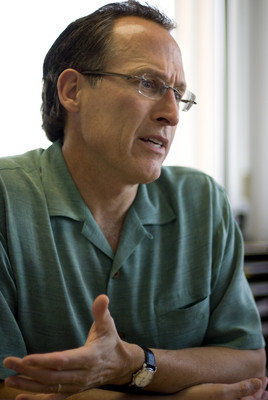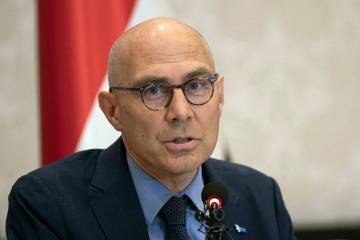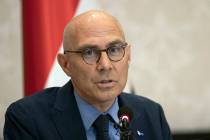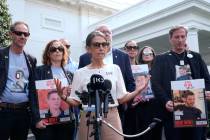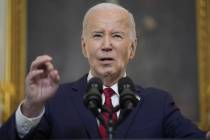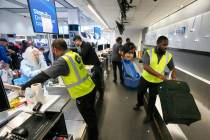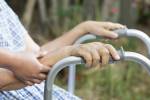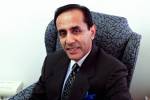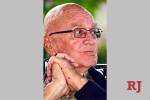HEPATITIS C BATTLE INTENSIFYING
Liver specialists in Nevada are seeing an increase in patients since health officials in February announced an outbreak of hepatitis C cases linked to an endoscopy clinic.
Dr. Robert Gish, a California physician who has had a part-time practice in Nevada for the past two decades, said his patient load has doubled since the outbreak was made public. Some of his new patients underwent procedures at the 700 Shadow Lane facility and have tested positive for hepatitis C. Other patients are just learning they have the disease and are seeking treatment, Gish said.
Dr. Donald Hillebrand, another liver specialist from California with a part-time Nevada practice, said his patient load "has picked up substantially."
Hillebrand was hired by Southwest Medical Associates in April to help with an anticipated growth in liver patients as a result of the outbreak, linked to the Endoscopy Center of Southern Nevada, 700 Shadow Lane.
Hillebrand said he is seeing two general types of liver patients in Southern Nevada. One group is composed of those with end-stage liver disease; the other consists of general hepatology patients, those with hepatitis C or B or who just need a liver doctor.
"I've seen a few individuals that were patients of the Endoscopy Center. Some of them have reasons for liver disease independent of the procedures. It is going to be a difficult task for someone to sort that out, to determine whether they got the disease at the clinic versus another time in life," Hillebrand said.
"We are talking to patients about that aspect, and it is frustrating. It is frustrating for the patients, and it is frustrating for us. ... What we tell our patients is, while it would be helpful to know the source, you have to move forward.''
That entails a liver specialist evaluating how much of problem hepatitis C is going to be for the patient, he said.
How treatable hepatitis C will be is strongly influenced by its strain, liver function and the patient's overall health. For many, losing weight through diet and exercise and abstaining from alcohol might be all they need.
Some patients will need to receive riboveron and interferon, drugs known more for their side effects than effectiveness.
"It was brutal,'' said Paul Lorenz, a patient of Gish who spent 66 weeks undergoing interferon treatment.
"It was pills in the morning, pills at night and an injection once a week. ... It was like having the worst flu you've ever had multiplied by 10. Aches, fevers, chills, sweat and a lot of time thinking crazy things. Everything they said would happen happened.''
Lorenz, an Air Force veteran, thinks his blood could have been tainted by inoculations during his deployment to Vietnam. Lorenz said he was so angry he could kill when he found out he had hepatitis C. He was not a patient of the Endoscopy Center or its affiliated clinic on Burnham Avenue that also was linked to hepatitis transmission.
Fortunately for Lorenz, an electrician, he is among the 50 percent of patients for which interferon works.
The virus has been undetectable in his blood for two years.
The same can't be said for another Gish patient, Raymond Sword, 55.
Sword, who said his hepatitis C could have been the result of drug use in the '70s and '80s, was diagnosed seven years ago after a routine physical exam. He began interferon treatments a few years later, which he calls "the worst thing that ever happened" to him.
Sword, a shuttle bus driver, ended up with cirrhosis, which eventually led to end-stage liver disease. On May 13, he had a liver transplant at California Pacific Medical Center in San Francisco.
Sword still has hepatitis C.
"Treatment for hepatitis C has come a long way; the bad news is we still have a ways to go,'' said Hillebrand, medical director of Scripps' Center for Organ and Cell Transplantation in San Diego. "There are still things we just don't know about treatment.''
In some cases, patients with acute hepatitis C have "cleared" the disease on their own, Hillebrand said.
The term acute hepatitis refers to the six-month period of time after the virus has entered the body and antibodies can be detected.
In about half of the acute hepatitis C cases, patients' immune systems are able to clear the disease, both doctors said.
"Hepatitis C is curable. You just have to know you have it and get treatment,'' said Gish, medical director of San Francisco's Pacific Medical Center's liver transplant program.
"This is a situation where there's much awareness about liver disease, so more people are getting tested for it. If ever there was anything positive from this outbreak, it is that there is more awareness about liver disease.''
In February, the Southern Nevada Health District announced that six people had contracted hepatitis C and that they all had undergone procedures at the Endoscopy Center's Shadow Lane facility.
An investigation by the Centers for Disease Control and Prevention and health district revealed that the reuse of syringes in a manner that contaminated vials of medication, and the reuse of those vials intended for a single patient, had exposed patients to hepatitis B and C and HIV.
Notifications were sent to more than 60,000 former patients of the Shadow Lane facility, as well as its Desert Shadow Endoscopy Center affiliate, urging them to get tested for the blood-borne viruses.
Health officials have not linked any HIV or hepatitis B cases to either of the two facilities; eight hepatitis C cases are linked to the Shadow Lane facility and one to the Burnham facility.
About 400 former patients of the Shadow Lane facility have tested positive for hepatitis C. Health officials have said 77 of them are "possibly" linked to that clinic.
In June, the health district set up a hepatitis C exposure registry to help identify patients who had procedures at the two clinics. A little more than 7,000 former patients -- 75 percent from Shadow Lane and 25 percent from Burnham -- have responded to the registry, said Brian Labus, senior epidemiologist.
While 95 percent of the patients are from Southern Nevada, registry respondents come from 43 states, Labus said. Their average age is 65.
Labus said 91 percent of the former patients reported no risk factors other than having a procedure done at the endoscopy center. Nine percent of the respondents reported having at least one risk factor.
"After hearing about the hepatitis C outbreak, I thought about whether I had ever went to any of those clinics,'' said Sword, a father of two teenagers.
"I never had, but it saddens me to know that a whole lot of people may have this awful disease because they did nothing other than go to the wrong place.''
Contact reporter Annette Wells at awells @reviewjournal.com or 702 383-0283.



